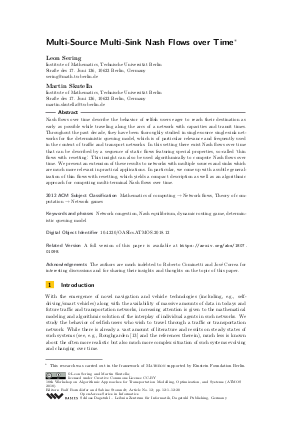Multi-Source Multi-Sink Nash Flows over Time
Authors Leon Sering, Martin Skutella
-
Part of:
Volume:
18th Workshop on Algorithmic Approaches for Transportation Modelling, Optimization, and Systems (ATMOS 2018)
Part of: Series: Open Access Series in Informatics (OASIcs)
Part of: Conference: Symposium on Algorithmic Approaches for Transportation Modelling, Optimization, and Systems (ATMOS) - License:
 Creative Commons Attribution 3.0 Unported license
Creative Commons Attribution 3.0 Unported license
- Publication Date: 2018-08-28
File

PDF
OASIcs.ATMOS.2018.12.pdf
- Filesize: 0.62 MB
- 20 pages
Document Identifiers
Related Versions
Subject Classification
ACM Subject Classification
- Mathematics of computing → Network flows
- Theory of computation → Network games
Keywords
- Network congestion
- Nash equilibrium
- dynamic routing game
- deterministic queuing model
Metrics
- Access Statistics
-
Total Accesses (updated on a weekly basis)
0Document
0Metadata
Abstract
Nash flows over time describe the behavior of selfish users eager to reach their destination as early as possible while traveling along the arcs of a network with capacities and transit times. Throughout the past decade, they have been thoroughly studied in single-source single-sink networks for the deterministic queuing model, which is of particular relevance and frequently used in the context of traffic and transport networks. In this setting there exist Nash flows over time that can be described by a sequence of static flows featuring special properties, so-called `thin flows with resetting'. This insight can also be used algorithmically to compute Nash flows over time. We present an extension of these results to networks with multiple sources and sinks which are much more relevant in practical applications. In particular, we come up with a subtle generalization of thin flows with resetting, which yields a compact description as well as an algorithmic approach for computing multi-terminal Nash flows over time.
Cite As Get BibTex
Leon Sering and Martin Skutella. Multi-Source Multi-Sink Nash Flows over Time. In 18th Workshop on Algorithmic Approaches for Transportation Modelling, Optimization, and Systems (ATMOS 2018). Open Access Series in Informatics (OASIcs), Volume 65, pp. 12:1-12:20, Schloss Dagstuhl – Leibniz-Zentrum für Informatik (2018)
https://doi.org/10.4230/OASIcs.ATMOS.2018.12
BibTex
@InProceedings{sering_et_al:OASIcs.ATMOS.2018.12,
author = {Sering, Leon and Skutella, Martin},
title = {{Multi-Source Multi-Sink Nash Flows over Time}},
booktitle = {18th Workshop on Algorithmic Approaches for Transportation Modelling, Optimization, and Systems (ATMOS 2018)},
pages = {12:1--12:20},
series = {Open Access Series in Informatics (OASIcs)},
ISBN = {978-3-95977-096-5},
ISSN = {2190-6807},
year = {2018},
volume = {65},
editor = {Bornd\"{o}rfer, Ralf and Storandt, Sabine},
publisher = {Schloss Dagstuhl -- Leibniz-Zentrum f{\"u}r Informatik},
address = {Dagstuhl, Germany},
URL = {https://drops.dagstuhl.de/entities/document/10.4230/OASIcs.ATMOS.2018.12},
URN = {urn:nbn:de:0030-drops-97176},
doi = {10.4230/OASIcs.ATMOS.2018.12},
annote = {Keywords: Network congestion, Nash equilibrium, dynamic routing game, deterministic queuing model}
}
Author Details
- Institute of Mathematics, Technische Universität Berlin, Straße des 17. Juni 136, 10623 Berlin, Germany
References
- R. Cominetti, J. Correa, and O. Larré. Existence and uniqueness of equilibria for flows over time. In L. Aceto, M. Henzinger, and J. Sgall, editors, Automata, Languages and Programming, volume 6756 of Lecture Notes in Computer Science, pages 552-563. Springer Berlin Heidelberg, 2011. URL: http://dx.doi.org/10.1007/978-3-642-22012-8_44.
- R. Cominetti, J. Correa, and O. Larré. Dynamic equilibria in fluid queueing networks. Operations Research, 63:21-34, 2015. URL: http://dx.doi.org/10.1287/opre.2015.1348.
- R. Cominetti, J. Correa, and N. Olver. Long term behavior of dynamic equilibria in fluid queuing networks. In F. Eisenbrand and J. Könemann, editors, Integer Programming and Combinatorial Optimization, volume 10328 of Lecture Notes in Computer Science, pages 161-172. Springer, 2017. URL: http://dx.doi.org/10.1007/978-3-319-59250-3_14.
- L. R. Ford and D. R. Fulkerson. Constructing maximal dynamic flows from static flows. Operations Research, 6:419-433, 1958. URL: http://dx.doi.org/10.1287/opre.6.3.419.
-
L. R. Ford and D. R. Fulkerson. Flows in Networks. Princeton University Press, 1962.

- A. Hall, S. Hippler, and M. Skutella. Multicommodity flows over time: Efficient algorithms and complexity. Theoretical Computer Science, 379:387-404, 2007. URL: http://dx.doi.org/10.1016/j.tcs.2007.02.046.
-
B. Hoppe. Efficient dynamic network flow algorithms. PhD thesis, Cornell University, 1995.

- B. Hoppe and É. Tardos. The quickest transshipment problem. Mathematics of Operations Research, 25:36-62, 2000. URL: http://dx.doi.org/10.1287/moor.25.1.36.15211.
- A. Horni, K. Nagel, and K. Axhausen, editors. Multi-Agent Transport Simulation MATSim. Ubiquity Press, London, 2016. URL: http://dx.doi.org/10.5334/baw.
- R. Koch and M. Skutella. Nash equilibria and the price of anarchy for flows over time. Theory of Computing Systems, 49:323-334, 2009. URL: http://dx.doi.org/10.1007/978-3-642-04645-2_29.
- H. Rademacher. Über partielle und totale Differenzierbarkeit von Funktionen mehrerer Variabeln und über die Transformation der Doppelintegrale. Mathematische Annalen, 79(4):340-359, 1919. URL: http://dx.doi.org/10.1007/BF01498415.
- B. Ran and D. E. Boyce. Modelling Dynamic Transportation Networks. Springer, Berlin, 1996. URL: http://dx.doi.org/10.1007/978-3-642-80230-0.
-
T. Roughgarden. Selfish Routing and the Price of Anarchy. MIT Press, 2005.

- M. Schlöter and M. Skutella. Fast and memory-efficient algorithms for evacuation problems. In P. N. Klein, editor, Proceedings of the 28th Annual ACM-SIAM Symposium on Discrete Algorithms, pages 821-840. SIAM, 2017. URL: http://dx.doi.org/10.1137/1.9781611974782.52.
- M. Skutella. An introduction to network flows over time. In Research Trends in Combinatorial Optimization, pages 451-482. Springer, 2009. URL: http://dx.doi.org/10.1007/978-3-540-76796-1_21.
